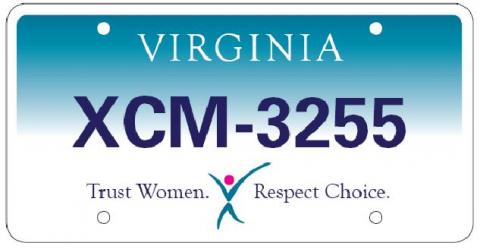Why the Big Disparity Between States Offering “Pro-Choice” And “Pro-Life” License Plates?
Virginia may become only the fourth state to offer a "pro-choice" specialty license plate. But why is there a huge disparity between the states that offer "choose life" plates and those that offer pro-choice ones?
You might have missed it over the holidays, but Virginia drivers may soon be seeing a pro-choice license plate on the road. Planned Parenthood of Virginia is now offering Virginians the chance to pre-order a specialty license plate that says “Trust Women, Trust Choice.” Specialty license plates are offered in Virginia and other states to help raise money for specific causes.
To establish a sp ecialty plate in Virginia, all plate sponsors “must demonstrate to the satisfaction of the General Assembly that [that they will] meet the statutory issuance requirements” for the plate by securing 350 orders before the state will approve production. Once the minimum number of orders is secured, approval is also required by the General Assembly.
ecialty plate in Virginia, all plate sponsors “must demonstrate to the satisfaction of the General Assembly that [that they will] meet the statutory issuance requirements” for the plate by securing 350 orders before the state will approve production. Once the minimum number of orders is secured, approval is also required by the General Assembly.
Courtney Jones, grassroots manager of Planned Parenthood of Virginia said pro-choice plates would give supporters another means of donating to Planned Parenthood. “We also felt it was important because the incoming governor [Bob McDonnell] has made it a priority to strip Planned Parenthood of its funding during the next legislative session,” Jones said.
After the first 1,000 plates are purchased, $15 of the $25 purchase price will go to Planned Parenthood, which in turn will use money to provide prevention services such as annual gynecological exams, testing for sexually transmitted infections, and follow-up care. The money will not be used to provide abortion-related services. Jones said they have about 100 pre-orders since the announcement was made December 18. Those interested in buying the plate can order them here.
Another reason for Planned Parenthood to offer the plate is to give Virginians a “contrasting viewpoint” on the issue of choice, Jones said. Last spring Virginia Department of Motor Vehicles began offering “Choose Life” specialty plate designs that were first created in Florida in 1998. In Virginia purchasers of the “Choose Life” plates are donating money to Heartbeat International, a network of crisis pregnancy centers. Such centers have been shown to provide misleading information on contraception, abortion, pregnancy, and safer sex.
Anti-choice groups have been particularly aggressive about getting approval of “pro-life” specialty plates, while pro-choice groups have not. If plans for pro-choice plates in Virginia go forward, it would become only the fourth state that offers this option. Currently only Montana and Pennsylvania offer versions of pro-choice specialty license plates, while Hawaii offers a decal that says “Respect Choice.” Meanwhile 24 states offer some version of the “Choose Life” plate or a similar design that is construed as having a pro-life message.
There may be several reasons why the disparity exists. Each state sets its own process for determining how specialty plates are created, some have a process by which citizens can put forward proposals that are determined by the Department of Motor Vehicles. But many states require acts by the state legislature which can quickly turn what is normally a non-controversial “rubber stamp” process into a political showdown between pro-choice and anti-choice legislators.
Janet Crepps is deputy director in the US Legal Program at the Center for Reproductive Rights. She also served as co-counsel in Hill v. Kemp, a case in Oklahoma where pro-choice advocates tried to block the sale of “Choose Life” plates on First Amendment grounds because the state makes it difficult for motorists to obtain pro-choice specialty license plates.
Crepps speculated that part of the reason for the huge disparity is that anti-choice groups are possibly more motivated than pro-choice organizations to put out the specialty plates.
“[Anti-choice groups] are aggressively trying to promote their views and just are more aggressive in doing pro-active legislation,” Crepps said. “They see [specialty plates] as a direct means for obtaining funding for crisis pregnancies centers and opening and funding crisis pregnancy centers is a big motive for anti-choice organizations.
Crepps said she doesn’t think pro-choice organizations dismiss the idea of putting out specialty plates, but that the struggle in some states to get the plates in place may not be viewed as worth the cost.
“”You need to pick your battles,” Crepps said. “If you looked to see what kind of pro-active legislation most pro-choice groups would want to pass they would probably focus on other things. I don’t think [getting a] pro-choice plate has been the battle for most states.”
Another cause for the disparity is that there is a national organization dedicated solely having “Choose Life” plates created in every state. There is no corresponding pro-choice organization dedicated to the same goal.
Last spring, after advocates in Virginia garnered enough pre-orders to demonstrate suitable interest to the General Assembly for a “Choose Life” plate – the normal process for specialty plate creation — Gov. Tim Kaine signed the required corresponding legislative bill. He said it was an issue of “free speech” not to deny Heartbeat International their plate when there are plates of other groups with controversial messages including “Sons of the Confederacy.”
“If Planned Parenthood . . . or another similar organization ever chooses to seek a specialty license plate in Virginia, I believe the constitution would require the state to approve that plate to protect against any viewpoint discrimination,” [Kaine] said.
